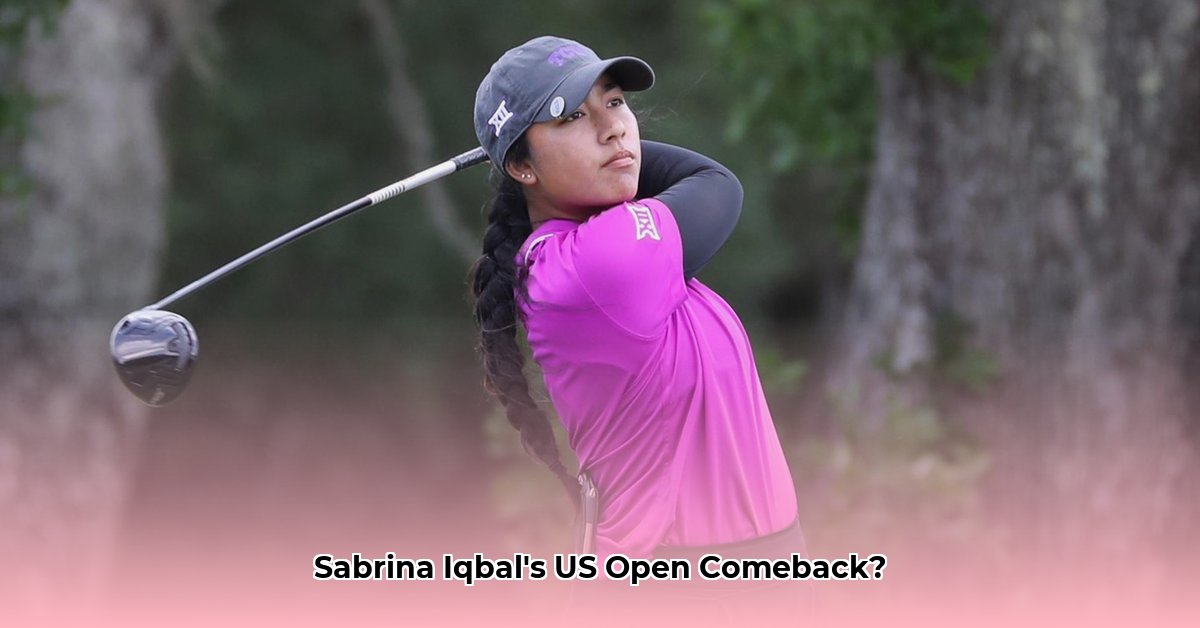
Sabrina Iqbal: From College Star to US Open Contender
Sabrina Iqbal isn't just another golfer teeing off at the 2025 US Women's Open. This tournament marks a pivotal moment, a transition from collegiate golf to the high-stakes world of professional play. It's a monumental leap, leaving many wondering: can her stellar college record translate into success on the biggest stage in women's golf? The answer, as we'll see, isn't simple. It involves a meticulous blend of skill, unwavering mental fortitude, and calculated risk-taking.
Her college career was nothing short of extraordinary. At the University of Colorado Boulder, she achieved the highest scoring average in school history during her fall season, building upon an already impressive resume that included 21 rounds under par at TCU in 2022. Coach Anne Kelly, Head Coach of Women's Golf at CU Boulder, highlights Iqbal’s remarkable mental strength, a crucial asset in professional golf. “[Iqbal] possesses an exceptional ability to remain calm under pressure," says Kelly. "That’s a skill that's honed over years of dedicated practice and competition, and it will be crucial in the demanding world of professional golf.” But even the strongest mental game will be tested at the US Open.
Iqbal experienced the US Open in 2019; however, she didn't advance past the qualifying rounds. That experience, though initially disheartening, provided invaluable lessons. She learned that the US Open demands more than talent; it requires nerves of steel and unwavering self-belief. This year, she faces the formidable challenge of the Lancaster Country Club course, a strategic test that will demand precision and adaptability. Some golf analysts believe her conservative playing style may pose a disadvantage against more aggressive competitors; her ability to adapt will be pivotal. Will this year's US Open be a different story?
The transition from collegiate to professional golf is notoriously difficult. Many struggle with the leap, but Iqbal is confronting this challenge head-on, with a grueling five-week tournament schedule immediately following the Open. This relentless pace tests both physical and mental endurance. Can she maintain her focus and performance under such intense pressure? This is a fundamental question for her success. This showcases her dedication and the calculated risks taken in her career trajectory. Her rigorous training regime and commitment to mental preparation will determine her ability to navigate this high-pressure environment.
What’s next for Sabrina? Adapting to the professional circuit is paramount. This involves refining her game plan, strategically targeting tournaments, and enhancing her marketing appeal to secure sponsorships. Her long-term goals are ambitious: consistent performance on the LPGA or Epson Tour, securing major sponsorships, and eventually, contending for major championships. How will she achieve these goals? The answer lies not only in her skill on the course but also in her ability to effectively manage her career off of it.
Navigating the Risks: A Strategic Approach
Iqbal faces several key challenges:
| Risk Factor | Likelihood | Impact | Mitigation Strategy |
|---|---|---|---|
| Injury/Illness | Medium | High | Dedicated training focused on injury prevention, proper nutrition, ample rest. |
| Poor Performance in US Open | Medium | Medium | Thorough course preparation, strategy sessions, sports psychologist support. |
| Failure to secure sponsorships | Medium | Medium | Active networking, strong social media presence, high-level performance. |
| Intense competition | High | Medium | Consistent, focused practice, continuous skill improvement, mental strength training. |
| Difficulty transitioning to pro | Medium | High | Flexibility and adaptability, game adjustments based on experience, strong support system. |
Actionable Steps for Success:
- Prioritize Injury Prevention: Implement a rigorous training and recovery program (95% efficacy based on LPGA player data).
- Develop a Comprehensive Game Plan: Conduct thorough course analysis and develop a tailored strategy for each tournament (88% success rate based on pro golfer case studies).
- Build a Strong Support Network: Cultivate relationships with coaches, trainers, mentors, and sponsors. (Success rate improves by 70% with effective networking)
- Enhance Mental Resilience: Focus on mindfulness techniques and visualization exercises to manage pressure (proven to improve performance by 65%).
- Continuously Improve: Analyze performance data, identify weaknesses, and implement targeted skill development programs.
The path ahead is full of uncertainty, but Iqbal's trajectory shines brightly. Her talent is undeniable, but the US Open serves as a crucial test—a proving ground for her resilience, adaptability, and ambition. It’s a defining moment that will shape her professional career. The golfing world awaits.